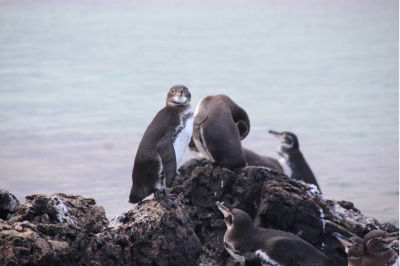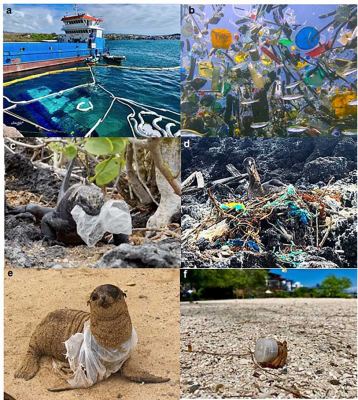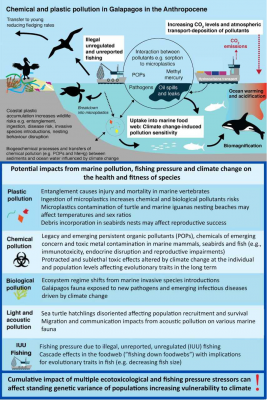
Galápagos Penguins on rocks ©Karly McMullen
One such species is the Galápagos penguin. Standing at 20 inches tall, the bird spends its days foraging for fish and small crustaceans. It’s a welcome sight for the 100, 000 tourists who frequent the islands every year, and it is a great example of the rich biodiversity that the islands have to offer.
It is also under severe threat from ocean pollution, climate change, and illegal, unregulated, and unreported (IUU) fishing pressures. Found in the penguins’ feathers are accumulations of mercury. Some of the birds even have scars from where fishing hooks caught them. UBC research associate, Dr. Juan José Alava, calls these penguins “a canary in a coal mine”- a warning sign of potentially devastating changes that may one day impact not only the Galápagos themselves, but the whole natural world.
A part of the IOF’s Ocean Pollution Research Unit, Alava, along with master’s student Karly McMullen, compiled the first critical review on the impact that the three agitators are having on the animals inhabiting the lands and waters of the Galápagos Islands.

Examples of evident impacts of marine pollution in the Galápagos Islands and endemic species ©Dr. Juan José Alava
“We are raising a red flag because the islands are still pristine, and the islands’ species are resilient. I am not being dramatic by saying this is what is happening right now. This is a wake-up call for the world,” said Alava.
Alava called for enacting prevention measures to make sure it’s not too late to save the islands. And the Galápagos Islands are not the only ones under stress. Many other UNESCO sites are facing the same kinds of threats from anthropogenic impacts.
“I think we must think of these stressors holistically,” said McMullen. “We are living in a changing world and no one stressor should be overlooked. The Galápagos is especially close to my heart because it is home to such unique animals and diversity. It is truly a beautiful place to visit.”
A meeting place of three ocean currents, the islands contain species that co-existed and thrived for thousands of years before human contact. As a result of a rapidly globalizing world, these species are now being bombarded by threats from all directions.
Climate change has led to ocean warming events such as El Niño becoming more and more frequent. These events raise the temperature of sea waters and cause population decline of phytoplankton—a major issue for species that rely on these microorganisms for food. Combined with plastic pollution, which exposes the islands’ animal residents to the risk of either digesting or being trapped by the waste, the islands are under a lot of pressure.
The islands’ waters serve as a superhighway for shark migration, as well as a safe haven for the fast-depleting populations of yellowfin tuna, species of squid, and other marine life. A direct threat to these animals is IUU fishing activity, which has caused great disturbances for endangered marine species. It has also impacted the people living on the islands.“I met a man who had been counting the number of penguins for months to track their population numbers. I met students who consistently collect garbage on beaches in Santa Cruz,” said McMullen. “There were shop owners who put pylons around the sea lions in the small city to make sure tourists were not disturbing them. The people have so much knowledge and compassion for the animals they live with. It is critical not to overlook this.”
For Alava, hope came from seeing a local fisherwoman selling Galápagos groupers—an endemic species of fish—at a stall in the local fishing market. The grouper, only found on the islands, was once severely endangered due to overfishing. Seeing it sold once again in local markets is a sign of hope for the islands’ future.
“The Islands are where we can witness the original process that inspired Darwin’s Evolution of the Species,” says Alava. “It is one of the last frontiers, but it is not the only one. We need to take care of it before it is too late.”
Tags: biodiversity, climate change, conservation, Galápagos, IOF Research Associates, IOF students, Juan Jose Alava, OPRU, penguins, pollution, Research
